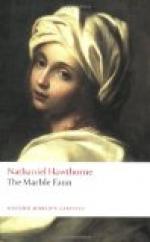“As to its precise contents,” interposed Kenyon, “it is impossible to speak. But Miriam, isolated as she seemed, had family connections in Rome, one of whom, there is reason to believe, occupied a position in the papal government.
“This Signore Luca Barboni was either the assumed name of the personage in question, or the medium of communication between that individual and Miriam. Now, under such a government as that of Rome, it is obvious that Miriam’s privacy and isolated life could only be maintained through the connivance and support of some influential person connected with the administration of affairs. Free and self-controlled as she appeared, her every movement was watched and investigated far more thoroughly by the priestly rulers than by her dearest friends.
“Miriam, if I mistake not, had a purpose to withdraw herself from this irksome scrutiny, and to seek real obscurity in another land; and the packet, to be delivered long after her departure, contained a reference to this design, besides certain family documents, which were to be imparted to her relative as from one dead and gone.”
“Yes, it is clear as a London fog,” I remarked. “On this head no further elucidation can be desired. But when Hilda went quietly to deliver the packet, why did she so mysteriously vanish?”
“You must recollect,” replied Kenyon, with a glance of friendly commiseration at my obtuseness, “that Miriam had utterly disappeared, leaving no trace by which her whereabouts could be known. In the meantime, the municipal authorities had become aware of the murder of the Capuchin; and from many preceding circumstances, such as his persecution of Miriam, they must have seen an obvious connection between herself and that tragical event. Furthermore, there is reason to believe that Miriam was suspected of connection with some plot, or political intrigue, of which there may have been tokens in the packet. And when Hilda appeared as the bearer of this missive, it was really quite a matter of course, under a despotic government, that she should be detained.”
“Ah, quite a matter of course, as you say,” answered I. “How excessively stupid in me not to have seen it sooner! But there are other riddles. On the night of the extinction of the lamp, you met Donatello, in a penitent’s garb, and afterwards saw and spoke to Miriam, in a coach, with a gem glowing on her bosom. What was the business of these two guilty ones in Rome, and who was Miriam’s companion?”
“Who!” repeated Kenyon, “why, her official relative, to be sure; and as to their business, Donatello’s still gnawing remorse had brought him hitherward, in spite of Miriam’s entreaties, and kept him lingering in the neighborhood of Rome, with the ultimate purpose of delivering himself up to justice. Hilda’s disappearance, which took place the day before, was known to them through a secret channel, and had brought them into the city, where Miriam, as I surmise, began to make arrangements, even then, for that sad frolic of the Carnival.”




